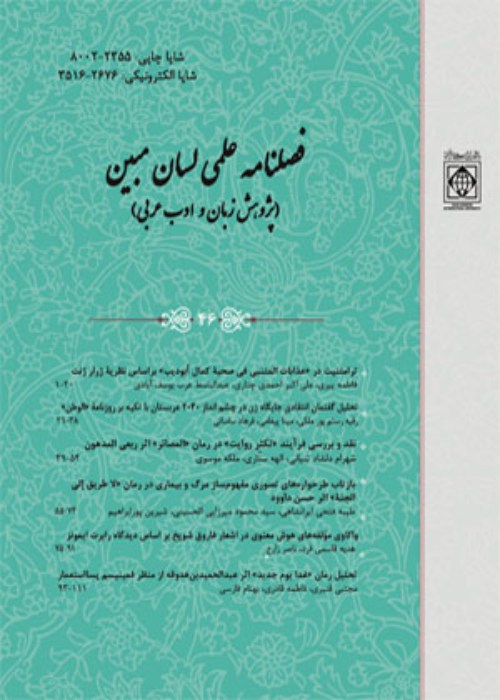A study of movement schemas in the Holy Quran from the perspective of cognitive linguistics ("من and "فی" as a model
This article aims to analyze the path schemas created by the two prepositions of “من” /ˈmin/ and إلی“” /ˈilaa/ in the Holy Qur'an from the perspective of cognitive linguistics, relying on the model of Lakoff and Johnson. This article tries to examine the path schemas (two prepositions of “من” and “إلی”) in the Holy Quran from the perspective of cognitive linguistics, and the scope of the research includes all cases in which the two prepositions “من” and “إلی” are mentioned together in the Qur'an.
The research data are taken from the Holy Quran. From this point of view, all the situations in which the use of “من” and “إلی” are mentioned in the Holy Qur'an in terms of combination have been selected and, relying on the descriptive and analytical approach, haven analyzed in terms of conceptual metaphor and abstract meanings in them.
Cognitive linguistics is an approach to natural language analysis that considers language as a tool for arranging, processing, and transmitting information (Muzaffari and colleagues, 2020: 43). When users of a language establish a linguistic connection, they process the information they have especially, give them special order and then pass it on to others in the form of linguistic expressions. (Dahman, 2015: 19-20) Cognitive linguistics is an approach to language study that studies the relationship between human language, mind, and social and physical experiences (Muzaffari and colleagues, 2020: 46).
The path scheme is one of the most important conceptual schemas devised by the European theorist Mark Johnson (1947) (Faydi et al., 2022: 111). Movement is one of the most important and unique human experiences that provide him with many of his life needs. Everything effective in a person's life also affects language (Battini, 1990: 58). In addition to the movements that are done in an objective and realistic way, some movements are not tangible and physical but are done abstractly and conceptually. There is a concrete example of this: the path we must take to obtain our academic degree. This path requires abstract and intangible movement.
The results of the research indicate that the semantic spaces of the letters “من” and “إلی” have broken the framework of lexical meanings and were presented at a higher level than them. Therefore, the semantic network of the two mentioned letters, apart from the basic meaning of “beginning” and “end”, includes other members of meanings such as transport and journey of abstract matters such as disbelief, faith, soul and… etc. With their central meaning, these two letters entered new conceptual fields through metaphors and movement schemes and created a network of different mental meanings that were affected by the change in the factor and the context of the text. In this regard, the movement scheme consisting of two prepositions of “من” and “إلی” in the Holy Quran is a part of the big scheme of “life as a journey,” which is through conveying the movement of abstract things such as “darkness”, “light”, “misguidance”, “guidance”, “return” are expressed and show the purpose of human life and the necessity of walking towards the end (meeting with the Lord of the worlds) with some systematic verbs such as “to go out”, and “to devise”. Moreover, “climbing”, “moving”, and “secret exit”.
- حق عضویت دریافتی صرف حمایت از نشریات عضو و نگهداری، تکمیل و توسعه مگیران میشود.
- پرداخت حق اشتراک و دانلود مقالات اجازه بازنشر آن در سایر رسانههای چاپی و دیجیتال را به کاربر نمیدهد.


